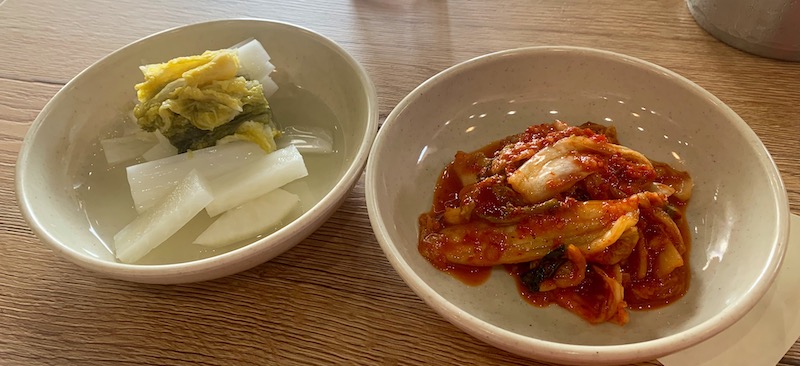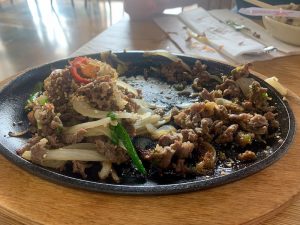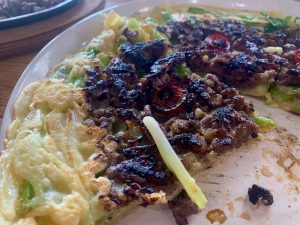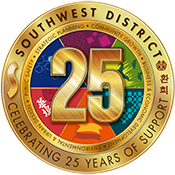
Taking its name from (and in partnership with) a Los Angeles-based tribute to a famous restaurant in Seoul’s fashion district, Myung Dong Kyoja has Chinatown abuzz with its tasty steamed dumplings and richly flavored soups and especially their knife cut noodles.
“Kyoja” means “dumplings” in Korean; Myung Dong is the name of the Seoul neighborhood, but in Houston, the restaurant has a second name: Myung Dong Kalguksu. It’s MDK either way, explains Los Angeles native Stacey Shin, only in Houston they like to tout their noodles as much as their dumplings. (Kalguksu is Korean for knife-cut noodle soup, their signature dish; the restaurant is also billed as MDK Noodles.)
Shin trained for approximately five years at MDK’s Los Angeles location (where her father is the owner) before coming to Houston to run the show there in Sterling Square, a sort of mini-Koreatown within Chinatown. Chung Chun Rice Hotdogs /Sol Bing Su (Korean desserts) is next door, and not far from both is Handam BBQ. All in all, Southwest Management District restaurants are starting to give those in Houston’s Long Point / Spring Branch Koreatown a run for their money, at least among non-Korean Houstonians, for now.

“Because many of them have to drive pretty far, we don’t have a whole lot of Koreans in our customer base right now,” says Shin. “A lot of our customers are Chinese or Vietnamese, which is great because it gives us a chance to expand our demographic.”
One thing that has already helped attract a loyal customer base is the restaurant’s commitment to quality and freshness. “We do stand behind the freshness of our food,” she says. “Our noodles and dumplings are made in-house fresh daily. Every single day we make batches of the noodles and the dumplings, so it’s all very fresh. And it’s all from scratch.”
Shin believes there are certain Korean dishes that might give them a leg up over nearby restaurants. “Houston weather is so hot right now most people are not in the mood for a hot soup,” she says. As a salve for the summer heat, she recommends their bibimguksu, or spicy mixed cold noodle soup served with chicken broth. “We boil the noodles and then put them in an ice bath,” she says. “And we mix them into our spicy sauce, so it’s got a lot of spiciness and it’s really good when it’s hot and you don’t want a bowl of hot soup: it’s super spicy and super delicious and I’ve been eating it almost every day, once a day. It’s really really great with our dumplings. ”
Dishes like that, Shin believes, set MDK apart from the competition. “Obviously we are in the middle of Chinatown and there are a lot of options for dumplings and soups, but I feel like this is a differentiating factor for Korean food. We have a whole lot of variety including so many cold dish options on our menu.”
Some people believe counterintuitively that it’s better to eat hot food and imbibe hot beverages in the summer heat. This is based on the idea that they trigger perspiration, and sweating cools you down. MDK has you covered in that department too. After all, Kalguksu, their signature dish, is right there in one of their names: Kalguksu is a very hearty chicken broth soup,” Shin says. “It’s a very flavorful and savory broth, topped with ground pork, and served with vegetables.”
 It seems like every culture has a magic soup like this, one to which healing powers are ascribed — chicken noodle in western culture, matzo ball soup among Ashkenazi Jews, tortilla soup to Mexicans and Mexican Americans, pho to the Vietnamese — this is what kalguksu means to Koreans. Shin adds that it is perfectly paired with their incendiary, sinus-clearing kimchi: “That is the only side dish we offer so it really has to shine, and with garlic and all the other ingredients and spices it also has health benefits,” she says. “Kimchi and kalguksu are the perfect pairing for anyone who might have a cold.” (For those with more sensitive palates, MDK offers a tasty and fresh unspiced kimchi too.)
It seems like every culture has a magic soup like this, one to which healing powers are ascribed — chicken noodle in western culture, matzo ball soup among Ashkenazi Jews, tortilla soup to Mexicans and Mexican Americans, pho to the Vietnamese — this is what kalguksu means to Koreans. Shin adds that it is perfectly paired with their incendiary, sinus-clearing kimchi: “That is the only side dish we offer so it really has to shine, and with garlic and all the other ingredients and spices it also has health benefits,” she says. “Kimchi and kalguksu are the perfect pairing for anyone who might have a cold.” (For those with more sensitive palates, MDK offers a tasty and fresh unspiced kimchi too.)
I’m a big fan of both bulgogi and Korean-style meat, seafood and vegetable pancakes, so on a recent trip I ordered a bulgogi pancake alongside several other dishes in a feast I enjoyed with my son, and an army veteran recently returned from a deployment to Korea. We feasted so heartily on soups, noodles and dumplings — pro tip: poke a small hole in them with a chopstick, and dunk them in chicken broth, et voila: instant soup dumplings — that I wound up taking three-quarters of my bulgogi pancake home. And lord have mercy is cold bulgogi pancake incredible — if you like cold pizza, this is even better. The tangy-sweet taste of the bulgogi comes through with more clarity and a day-after Korean pancake has none of the sogginess that might put you off a slice of cold pizza. I seriously came to believe that Korean pancake delivery could take the country by storm Domino’s style — just make them bigger and offer more ingredients and then sit back and print money.
MDK Noodles had the misfortune to open this year, on Memorial Day weekend, just as the pandemic’s true implications were taking hold over Texas. Though still open for in-house dining as of early July, they do have a bevy of other options available. “We really took the initiative to set up our delivery right away,” says Shin. “Obviously we work with companies like Postmates, GrubHub, and Doordash but we also did set up our own in-house online ordering. That website is going to be set up soon [for delivery], but for now you can either call or order online and then can come pick it up.”
MDK Noodles
9798 Bellaire
281.888.3141





